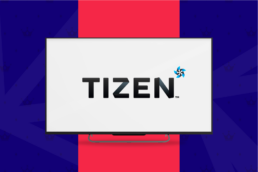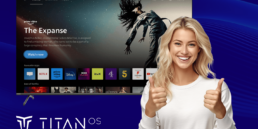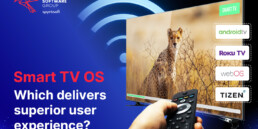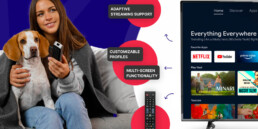One of the most popular operating systems is Tizen. It offers a lot of possibilities and is often underrated. Tizen may be the right environment for creating a streaming platform, app, or software if you know how to make the right use of it. Statistics clearly show that Tizen is the leader in TV devices for streaming platforms worldwide with a market share of 11%.
What is Tizen, how does it differ from other OS, and what are its benefits? You’ll find all the answers in our comprehensive guide.
What Is Tizen?
Tizen is an open-source operating system based on Linux and hosted by the Linux Foundation. In other words, Tizen is nothing else but another operating system for different devices. It’s just like Android or iOS. It’s open to developers and anyone who wants to contribute. You can freely use it to develop the system software and applications, and share them with the world.
In Tizen, all profiles are built on top of a common, shared infrastructure called Tizen Common. This is an important characteristic because openness gives growth opportunities. Tizen is a perfect environment for adaptability and customization for new products.
Since Tizen is based on common elements and features, it’s much easier to adapt the end product to emerging technologies and customize your end product even more.
Additionally, Tizen OS allows you to seamlessly sync different devices to create a unified ecosystem and improve the user and developer experience.
Tizen may be a good alternative to other popular operating systems. Hence, if you’re looking for something non-standard, Tizen may be the right choice.
What Devices Is Tizen Good for?
Tizen is a flexible OS and supports multiple devices. However, you’ll only see it on Samsung electronics. That’s because it was developed and used primarily by Samsung. Eventually, it became wide-open and is now available for everyone.
Here’s a quick list of Tizen-supported devices:
- Wearables
- Smartphones
- Smart TV
- Netbooks
- In-Vehicle infotainment systems (devices that deliver navigation, entertainment, etc.)
Basically, Tizen OS can be used on any electronic device. It’s not limited to only one app, so it gives you more chances to reach out to the audience.
This operating system allows for a consistent user experience across all devices to easily access all content, and watch favorite TV shows and movies whenever and wherever viewers are.
How Is Tizen Different from Other OS?
Some people claim that Tizen OS is not as good as iOS and Android. It’s still growing and in the near future will expand its functionalities.
What’s the difference between Tizen and other OS? Let’s get deeper.
Features
In fact, Tizen is no different than other popular OS. Just like, for example, Android OS, it has strong points and few limitations.
Here are the main functionalities in a nutshell:
- Allows making the user interface unique and personalized due to being open-source. Developers can flexibly make changes, adjustments, and experiment with new ideas.
- It’s based on HTML5 — that allows for shorter development cycles and lower costs of developing apps. Additionally, developers with knowledge of HTML can build a user-friendly, interactive interface that improves UX.
- Applications built on top of this OS work well with Android.
- Tizen has a lightweight interface and is easy to navigate within for both developers and users.
- Since Tizen is available on Samsung, it works perfectly with all Samsung devices.
- Tizen OS works across different devices (smart TV, smart cameras, appliances, smartphones, and more), making it universal and more flexible for users. It enables people to connect every device and have a coherent set of tools that complement each other.
- In smart TV, the interface may have slight differences from popular Android TV, but in general, it works the same way with bottom-bar menus, settings, and other elements.
- Tizen provides scalability and high performance.
Overall, Tizen is another operating system. It’s very similar to Android. It may differ from other OS with smallish features that may be suitable for some, and bother others. But it all depends on personal preferences.
IoT
IoT (Internet of Things) is something you may not necessarily find in other OS. At least not on such a large scale. What’s IoT about in Tizen and why is it so important? It’s about two important aspects:
- Device convergence — in other words, all devices are interconnected. That gives more possibilities to expand control over different devices.
- Connectivity simply means that all your devices with Tizen create a unified system. You can freely connect them. That’s the case with a “smart home” where you can synchronize all devices to make your home a better place to live. It’s like taking a bath while controlling the music volume, vacuum cleaner, and light brightness with your smartphone.
When it comes to IoT, Tizen OS has a much bigger advantage over other operating systems. It seamlessly syncs across different appliances and devices. This means a better user experience and higher comfort of living.
Tizen Studio
Tizen Studio is a development platform. It allows software developers to develop, build, debug, profile, and emulate Tizen native and web apps. It has a library with about 200 online sample applications. These can help you better understand the framework and come up with your own ideas.
You can use Tizen Studio for platform or app development to optimize app and base your work on already tested solutions. Or you can build the product in your favorite environment.
Overall the difference between Tizen OS and other systems is not that significant. Tizen is still developing so you can expect more to come in the future.
Is Tizen Better Than Android or iOS?
Android and iOS are still thought to be the most popular operational systems for mobile devices. But there’s a reason why Tizen is a leader in the TV devices for streaming platforms.
Let’s look at the pros and cons of Tizen OS to see all the good and bad sides of the system.
Pros of Tizen:
- It’s a lightweight environment, easy to move around, with a user-friendly interface.
- From a technical point of view, it consumes less battery and is well-optimized. Generally, Samsung devices consume less power.
- It’s supported by Intel. That’s an important aspect because Intel supports Samsung so you can be sure there’s a lot to come for Tizen OS. Even if it’s limited now, it’ll most likely evolve in the nearest future.
- The app library may be limited, but it supports all the popular streaming platforms.
- It offers seamless smartphone casting.
- Based on IoT, Tizen supports all devices and provides a comprehensive and advanced user experience that everyone can personalize.
Cons of Tizen:
- It can be difficult for non-tech-savvy people as it may require a lot of customization. What’s more, the documentation lacks some of the important information, so you need to have the right knowledge and skills to use this OS. And it’s not always easy to find the solution to the problem in the community.
- No app store is available which may limit access to users’ favorite content.
- Some people complain that it’s not as intelligent, when it comes to smart suggestions or recommendations, as Android.
Is Tizen Good for You?
There’s no one-size-fits-all formula when it comes to choosing the right OS for you. Everything depends on several important factors:
- The purpose for which you want to create your platform or app
- Your budget
- What’s your niche, who you want to aim your platform at
- Your or your team technical skills and knowledge
- What devices it will support
Before choosing the OS system for your streaming platform or application, it’s a good idea to consider all the pros and cons. Or, in case of doubts, consults the experts who will help you make the right choice. You can also hire the right people to create the platform for you from scratch.
Conclusion
If you’re considering building a streaming platform based on Tizen OS, it’s a good idea to analyze your needs before you make the decision. It’s a robust system with many advantages.
Nevertheless, Tizen will broaden its ecosystem as the market requirements and user demands are constantly increasing, so you can expect more. And with the right skills, your developers can build another wonder of the world.
If you’re not sure what’s best for you, reach out to us, we’ll give you a hand and help you choose the best solution!
If you find this article valuable, you can share it on social media →
Read more about the Smart TV applications!
February 20, 2024
What is Titan OS and what do we know about it so far?
Explore what distinguishes Titan OS, a new smart TV operating system. Discover its unique features before giving it a try yourself.
January 30, 2024
Smart TV operating systems: which offers the best user experience?
Discover the best Smart TV operating systems in our expert analysis. Compare top platforms, focusing on user experience.
November 23, 2023
7 Smart TV Features for a Seamless Streaming Experience
Discover emerging opportunities in the Smart TV market. Find out how service providers can leverage enhanced Smart TV features to stay ahead.
Are you looking for a partner to build an application on Smart TV?
Leave your email and a short description about your project. We would gladly discuss different cooperation possibilities!





